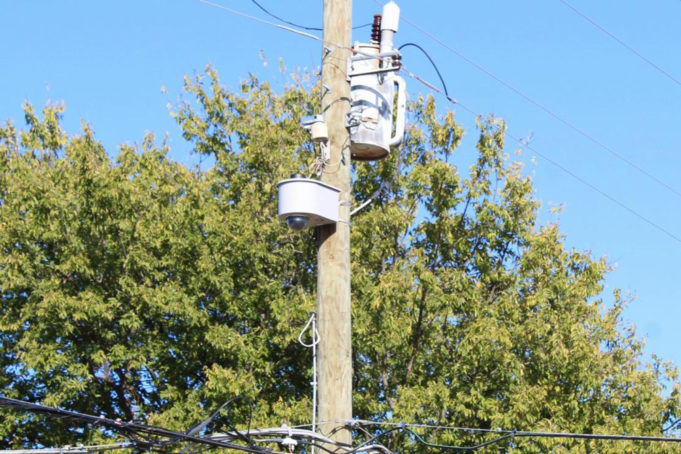The line between public safety and trampled Constitutional rights is one that law enforcement officials deal with on a daily basis. In Fort Worth, those discussions have increasingly revolved around the use of police cameras.
The Fort Worth police department maintains several surveillance initiatives, including the Neighborhood Camera Program, which places cameras in “strategic areas,” according to the police; the Community Camera Program, which relies on locals to voluntarily submit video footage; and new initiatives like 63 solar-powered license plate-reading cameras that were recently placed in high-crime areas in Fort Worth. The purchase of the solar-powered cameras has so far led to the arrest of two suspects, FWPD recently told NBC 5.
A map of the new license plate-reading cameras “would likely overlay perfectly with an income map of the city,” one local wrote when the topic was discussed in the Facebook group Enough Is Enough, one of several online outlets for the grassroots group that mobilized dozens of Fort Worth protests against police brutality last summer.
What may appear as cynicism to some is the basis of concern to people living in Como, Stop Six, and other predominantly Black neighborhoods. Leon Reed, a retired Marine and current criminal defense lawyer, brought the publicly viewable cameras to our attention late last year (“ Public Safety of Over Policing?,” Nov 2020). Reed requested the locations of the tax-funded electrical pole-mounted cameras through an open records request that he filed last June. The Secretary’s Office of Fort Worth, which handles open records requests, refused to release the locations of the cameras, which has only further fueled speculation that the surveillance programs are unevenly aimed at Black and brown communities.
What is happening in Fort Worth “seems pretty concerning and part of a growing trend and problem of over-surveillance, particularly in Black neighborhoods,” said Brian Klosterboer, staff attorney for the ACLU of Texas. “The ACLU has long opposed the use of mass surveillance, including public video tools. It is not an effective crimefighting strategy. It is not something that keeps communities safe. It can lead to a lot of abuse by police departments through discriminatory enforcement.”
In 2019, according to the city, Black drivers accounted for 38% of vehicle searches even though that demographic accounts for 19% of the local population and an even smaller portion of car owners. Black drivers were significantly overrepresented across a wide range of police interactions — without exception — between 2003 and 2019, according to Fort Worth police department data.
In an email, Reed said that several recent community meetings have been held between residents of primarily Black neighborhoods and Fort Worth police department officers. One officer disclosed that the majority of police cameras are currently placed in predominantly minority neighborhoods, Reed said.
The officer “would not go into detail on the number of cameras” Reed continued. “He basically told us what he wanted us to know. But he never provided the details and suggested that if we wanted more information than what he was willing to tell us that we should file for an open records request. We know how that ended up.”
The constitutionality of Fort Worth’s police camera program largely depends on where the cameras are placed, Klosterboer continued.
“The cameras could be invading people’s right to privacy,” he said. “How [the program] is used could lead to due process issues if it’s leading to police targeting people or harassing people.”
If the cameras were placed in a manner that was “racially targeting and profiling people,” he said, that would seem “egregious — it isn’t the Texan way for the government to be monitoring every aspect of our lives.”
City officials successfully argued that releasing the locations of the publicly viewable cameras, which are posted in plain sight, would result in the “destruction of the city property.”
If Fort Worth officials have “data on general locations of the cameras, like by ZIP code or neighborhood, that wouldn’t implicate any terrorism or security concerns,” Klosterboer said. “I imagine the people who are seeking this information want to know the broader picture. That’s where the city should disclose generally where they are putting the cameras. The Texas Public Information Act provides the bare minimum of what they are supposed to disclose. The city can always go beyond that to be more transparent and do more to disclose information to the general public.”
As a longtime advocate for civil liberties, the ACLU and others have not-infrequently sued the National Security Agency (NSA) and other governmental groups that support mass surveillance programs, he said.
“It is hard to say specifically if this issue in Texas would lead to that type of litigation,” he said. “It is definitely something we will monitor. [These types of programs] could exacerbate racial disparities in Texas’ broken criminal justice system.” — Edward Brown
This article has been updated to include quotes by Leon Reed.












